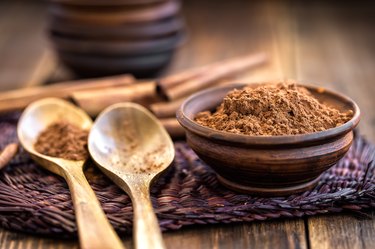
Found in certain tree bark, cinnamon is an aromatic spice well known for its versatility in cooking, and its ability to reduce blood sugar and soothe an upset stomach. Cinnamon, however, can have several negative health effects if eaten in too great a quantity or when paired with particular drugs.
The Coumarin Question
Video of the Day
Cinnamon is high in a chemical compound called coumarin. Coumarin is a polyphenol, responsible for some of cinnamon's distinct flavor and smell. For people with sensitive or damaged livers, coumarin can cause significant problems: it increases enzyme activity in the liver, which can express itself as jaundice if left unchecked. In humans, this inflammation will disappear without lasting damage if coumarin consumption is reduced. But animal tests have shown a relation between high coumarin intake and the development of some cancers, so it is wise to exercise caution.
Video of the Day
Anti-Coagulation -- Blessing and Curse
Cinnamaldehyde is an oil found in cinnamon. In rodent studies, cinnemaldehyde reduces the ability of blood to clot, by preventing the release of key fatty acids from cells. This could be useful if you are experiencing blood clots in your circulatory system, but extremely problematic if you are wounded or are using blood-thinning medication because combination could cause your blood pressure to drop to dangerous levels.
Hormonal Disruption
Research published in the journal "Environmental Toxicology and Pharmacology" in 2008 found that the coumarin in cinnamon can also have a serious influence on the behavior of estrogen in the body. It can stop estrogen from binding to receptors; this disrupts hormonal messaging and can interfere with normal gene expression. It can also cause hyperactive cell growth in bones.
The Cinnamon Challenge
Among adolescents, a "cinnamon challenge" consists of eating a tablespoon of cinnamon in one go. Ingesting large amounts of cinnamon can be extremely damaging to the lungs and digestive system. Cinnamon has high levels of indigestible cellulose that, if inhaled, can cause extensive damage to the lungs and can even trigger asthma attacks. This cellulose can also cause intractable constipation if ingested, along with damage to the intestinal wall.
- Huffington Post: Healthy Herbs: 25 of the Best for Your Body
- Federal Institute for Risk Assessment: Frequently Asked Questions About Coumarin in Cinnamon and Other Foods
- Thrombosis Research: Cinnemaldehyde Reduction of Platelet Aggregation and Thrombosis in Rodents
- Environmental Toxicology and Pharmacology: Screening of Estrogenic and Antiestrogenic Activities From Medicinal Plants
- Pediatrics: Ingesting and Aspirating Dry Cinnamon by Children and Adolescents: The "Cinnamon Challenge"
- Phytotherapy Research: Stimulatory Effects of Extract Prepared from the Bark of Cinnamomum Cassia Blume on the Function of Osteoblastic MC3T3-E1 Cells